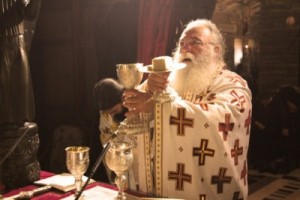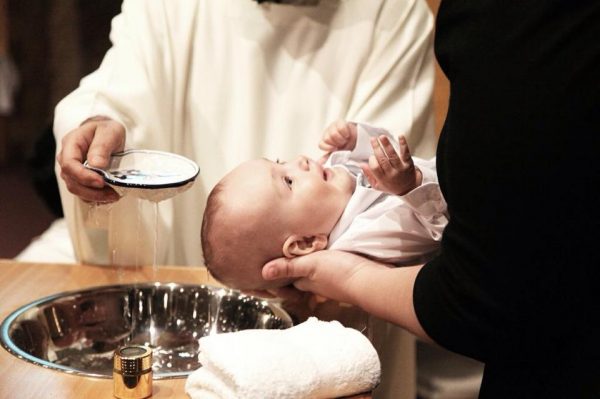![]() Many people today are made to pass by a dry-erase board at work, hanging prominently where everyone is bound to see it many times a day, tracking their job performance month-to-month and keeping all employees in a constant game of mutual comparison.
Many people today are made to pass by a dry-erase board at work, hanging prominently where everyone is bound to see it many times a day, tracking their job performance month-to-month and keeping all employees in a constant game of mutual comparison.
Unfortunately, this method of employee motivation works, works very well. And it cost the business nothing!
It works well because it plays on powerful motivating factors in the human psyche – social acceptance and personal efficacy. For too many, the work place dry-erase board is a microcosm of life—a life animated in large part by a strong sense of individualism and autonomy; an “every man for himself,” thing.
Often when a Christian crosses over from this conditioning into the religious-spiritual environment little seems to change; it’s still a private affair: “just me, my Bible, and Jesus!”
What is interesting is that many people who claim to endorse the independent/autonomous lifestyle also begrudge the concomitant isolation it inevitably brings.
For most people, regardless of the outward enthusiasm for independence, there lies a deep desire for intimate community. For the Orthodox Christian, this desire is understood to be the natural orientation of the human soul. Being created in the image and likeness of God, humans, like God, are communal by nature (God is Trinity). It is the radical individualism experienced from all corners in daily life that are the expected manifestations of human nature when removed from its communion with God. The sacrament of baptism is the path Christ provides for return to this union.
This is not to say that baptism is a communal event and nothing more. Like repentance, baptism engages the whole person in the most private manner possible. I like how Kierkegaard describes the way in which God confronts each individual person by requiring them to enter His kingdom through the parabolic “narrow gate”. He relates it to the image of the battle of Thermopylae, where the 300 Spartans held off the Persian armies by forcing them through a narrow pass; in a like manner God holds back the crowds and takes in each person one-on-one.
In baptism, truly, each person is required to present himself or herself alone as a living sacrifice unto God; i.e., preparing themselves with devoted contemplation of the personal commitment laid before them. It is a “private” affair through-and-through, insofar as the believer is called upon to assume full responsibility for his or her baptismal vows.
However, as in all the sacraments of the Orthodox Church, baptism is constituted in the ecclesial community; its very reality—its ontological substance—is found within this community, and for two primary reasons: (a) Orthodox baptism is a baptism into the death and resurrection of Christ, and (b) baptism is made in the name of the Father, Son, and Holy Spirit. The former reveals baptism as the initiation into Christ’s body—His body is the Church; the latter reveals baptism as one’s new birth in the Holy Trinity—God Himself a communion of three Persons. Thus, baptism is both a private and communal event in the most profound of ways.
Connection between Baptism and the Eucharist
In the early liturgical tradition baptism was a three-part sequence and practiced as a single order (or “ordo”). First the initiate experienced water baptism, then chrismation, then participation in the Eucharist. These three sacraments reveal the content of the new life in Christ: in baptism one is “born anew of water and of spirit,” and is made open to the gift of the Holy Spirit; chrismation is the sacrament whereby one receives the Holy Spirit Who then opens access to the Church—to Christ’s table in His kingdom.
It is essential to note that each of these sacraments employ matter as the conduit of the sacraments: water in baptism, oil in chrismation, and bread and wine in the Eucharist. Few subjects within the broader Christian theological spectrum (particularly within the various western traditions) have spurred more debate than the question over what is meant by these physical elements and their place in the sacraments.
For the Orthodox, and indeed for many high-sacramental traditions, the elements are the very thing they symbolize. However, whereas the Latin traditions tend to emphasize sacramental “form” and “essence” (the form essentially relating to the sacrament’s validity, and the essence relating to its actuality—the means of grace, and the grace itself), which make the physical elements essential for “validating” the sacraments, the Orthodox have historically ignored such distinctions. Alexander Schmemann’s thoughts on this are worth quoting in full:
In the early Church grace meant above all that very victory over all dichotomies—‘form’ and ‘essence,’ ‘spirit’ and ‘matter,’ ‘sign,’ and ‘reality’—which is made manifest in the sacrament and, indeed, in the whole life of the Church and which ultimately is the victory of Christ Himself, in whom and by whom the ‘forms’ of this world can truly be, truly communicate, truly fulfill that which they ‘represent’: the epiphany, in ‘this world’ of the Kingdom of God and of its ‘new life.’
This reasoning of the early Church hastened the rejection of the popular ancient Greek constructs of dualism, which drew a clear distinction between matter and spirit; i.e., that matter was essentially evil and spirit essentially good. This rejection was based on a thorough application of the incarnation of Christ.
 At the risk of going slightly off topic, it is worth touching this vital point in order to help present a full-orbed understanding of the sacraments. Because God Himself took on human flesh, was crucified in the flesh, and rose from the dead in the flesh, the Orthodox see physical matter as the very conduit by which God chose to accomplish man’s salvation.
At the risk of going slightly off topic, it is worth touching this vital point in order to help present a full-orbed understanding of the sacraments. Because God Himself took on human flesh, was crucified in the flesh, and rose from the dead in the flesh, the Orthodox see physical matter as the very conduit by which God chose to accomplish man’s salvation.
The argument is that if Christ was truly God and truly man then physical matter is not inherently evil, else Christ could not have taken human flesh. Thus, as stated by Schmemann above, the dichotomies so prevalent in early Greek thought were contradicted by Christ’s incarnation. In a like manner, the baptismal waters, the chrism oil, the Eucharistic elements, are not mere symbols pointing to a reality beyond them, but are the very “epiphany” of what they signify. They are symbols in the classical sense of the word: they are the very manifestation of what they represent, not mere theatrical devises meant to heighten the imagination.
Circling back to the connection between baptism and the Eucharist, after unraveling some of the finer points one begins to see that baptism and the Eucharist complete each other in that they actualize the Church. For the Orthodox, the Eucharist is viewed as the epiphany of the “Marriage Supper of the Lord,” the very manifestation of the Church, the communion of the Body and Blood of Christ. As such it is the crowing point of the Church’s liturgical life. In this view the Eucharist is revealed as the self-evident and necessary fulfillment of baptism. If, as Schmemann notes, “Baptism… integrates us into the Church,” and “the Church’s ultimate being and essence are revealed in and through the Eucharist, then of necessity to enter the Church is to enter into the Eucharist, then the Eucharist is indeed the fulfillment of baptism” (“Of Water and the Spirit,” 118).

















